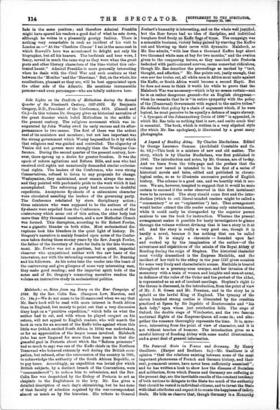Side Lights on the Conflicts of Methodism during the Second
Quarter of the Nineteenth Century, 1827-1862. By Benjamin Gregory, D.D., President of the Conference, 1879. (Cassell and Co.)—In this volume Dr. Gregory gives an historical narrative of the great disaster which befell Methodism in the middle of the present century. The religious movement which was in- augurated by John Wesley owed its early success and its after- permanence to two causes. The first of these was the ardent zeal of its ministers and members ; but not less important was the strong government which Wesley bequeathed to it by which that religious zeal was guided and controlled. The oligarchy of Venice did not govern more strongly than the Wesleyan Con- ference. During the second quarter of the present century, how- ever, there sprung up a desire for greater freedom. It was the epoch of reform agitations and Reform Bills, and men who had received civil rights not unnaturally demanded similar ecclesias- tical rights. The leaders of the Conference, who were strong Conservatives, refused to listen to any proposals for change. Weeleyanism, they maintained, must remain always the same; and they pointed with pardonable pride to the work which it had accomplished. The reforming party had recourse to doubtful expedients. Anonymous fly-sheets of a calumnious character were circulated assailing the leaders of the governing party. The Conference retaliated by stern disciplinary action ; three ministers who were supposed to be the authors of the fly-sheets were expelled from the Conference. As a result of the controversy which arose out of this action, the older body lost more than fifty thousand members, and a new Methodist Church was formed. This disruption, according to Sir Robert .Fowler, was a gigantic blunder on both aides. Most ecclesiastical dis- ruptions look like blunders in the quiet light of history. Dr. Gregory's narrative is mainly founded upon notes of the Confer- ence taken during those stormy years by the Rev. Joseph Fowler, the father of the Secretary of State for India in the late Govern- ment. Mr. Fowler was not a partisan, but a quiet, impartial observer who sympathised neither with the raw haste of the innovators, nor with the unbending conservatism of Dr. Bunting and his followers. As his notes take the reader into the heart of the controversy and give glimpses of some very interesting men, they make good reading ; and the impartial spirit both of the notes and of Dr. Gregory's connecting narrative renders the volume an instructive study in ecclesiastical politics.


















































 Previous page
Previous page